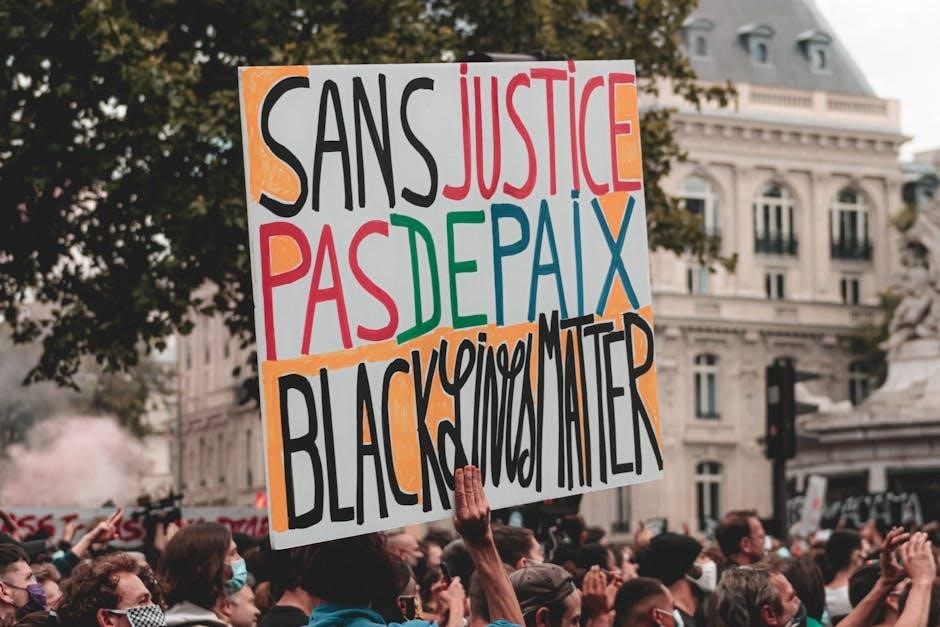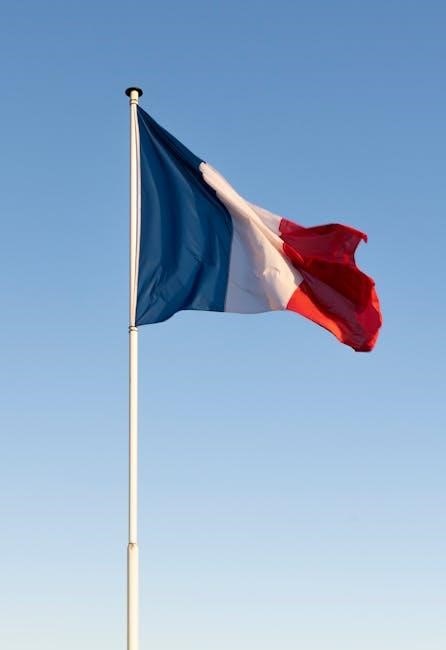The French party system is shaped by a dynamic interplay of political ideologies, historical context, and legal frameworks, influencing governance, elections, and societal representation. Political parties in France are governed by the 1901 law on associations, organizing themselves as long-term entities. They play a central role in shaping political life, competing in elections, and forming governments. The system reflects a balance between stability and change, with parties adapting to evolving societal demands and electoral pressures. This introduction sets the stage for exploring the complexities of France’s political landscape.
1.1 Overview of Political Parties in France
France’s political landscape features a diverse array of parties, ranging from centrist to extreme ideologies. Major parties like La République En Marche! (LREM), National Rally (RN), Socialist Party (PS), and The Republicans (LR) dominate elections. Smaller parties, such as La France Insoumise (LFI) and Europe Écologie Les Verts, also play significant roles. These parties shape governance, reflect societal divisions, and influence policy-making, embodying the dynamic nature of French politics.
1.2 Historical Context of French Political Parties
France’s political party system has evolved significantly since the Third Republic, shaped by revolutions, wars, and social changes. The post-war era saw the rise of dominant parties like the Socialist Party and the Gaullists. The Fifth Republic’s stability influenced party structures, with ideological shifts reflecting societal transformations. Historical events continue to shape France’s political landscape.

Major Political Parties in France
France’s political arena features prominent parties like La République En Marche!, National Rally, Socialist Party, The Republicans, and La France Insoumise. These parties represent diverse ideologies, shaping the country’s political dynamics and elections.
2.1 La République En Marche! (LREM)
Founded in 2016 by Emmanuel Macron, La République En Marche! emerged as a centrist force, breaking traditional party lines. It won a majority in the 2017 legislative elections, advocating for pro-European policies and political reform. Macron’s 2022 re-election underscored LREM’s enduring influence, shaping France’s governance with its pragmatic, modern approach to addressing societal and economic challenges.
2.2 National Rally (RN)
National Rally (RN), formerly known as the National Front, is a right-wing populist party advocating for French nationalism and sovereignty. Founded by Jean-Marie Le Pen, it gained prominence with Marine Le Pen’s leadership, softening its image while maintaining anti-immigration and euroskeptic stances. RN has seen electoral success, particularly in the 2022 legislative elections, becoming a key opposition force in French politics.
2.3 Socialist Party (PS)
The Socialist Party (PS) is a center-left party historically dominant in French politics, advocating for social justice and equality. Founded in 1969, it led governments under leaders like François Mitterrand and François Hollande. Despite recent electoral declines, PS remains influential, particularly through local governance and alliances, focusing on progressive reforms and workers’ rights, adapting to a changing political landscape.
2.4 The Republicans (LR)
The Republicans (LR) is a major right-wing party in France, rooted in the Gaullist tradition. It advocates for economic liberalism, law and order, and national identity. LR has historically produced prominent leaders like Jacques Chirac and Nicolas Sarkozy. The party has faced electoral challenges but remains influential, often forming alliances, including with President Emmanuel Macron’s centrist coalition.
2.5 La France Insoumise (LFI)
La France Insoumise (LFI) is a far-left party led by Jean-Luc Mélenchon, advocating for radical social and economic reforms. It opposes austerity and champions climate action, workers’ rights, and public services. LFI has formed alliances with other left-wing parties and gained visibility through Mélenchon’s strong presidential performances, emphasizing anti-establishment and sovereignty-focused policies.

The Electoral System and Its Impact on Political Parties
France’s electoral system significantly influences party dynamics, with the two-round majority system favoring coalitions and larger parties, while proportional representation enables smaller parties to gain representation, shaping political alliances and strategies.
3.1 The Two-Round Majority System
The two-round majority system in France eliminates candidates in the first round, advancing only those with the highest votes to the second round. This system fosters coalition-building and reduces political fragmentation, often resulting in a stable majority in the National Assembly. It incentivizes strategic voting and alliances, shaping party strategies and governance outcomes effectively.
3.2 Proportional Representation and Its Effects
Proportional representation in France allocates seats based on vote share, promoting diverse representation. This system empowers smaller parties like the Greens and Communists, fostering coalition governments. It encourages political pluralism but can lead to fragmented parliaments, necessitating alliances and compromising on policies, thus influencing party strategies and voter behavior significantly in elections.

Political Alliances and Coalitions
Political alliances in France often form to amplify influence, with parties collaborating to secure electoral success. These coalitions shape policy agendas and governmental stability, reflecting shifting ideological alignments and strategic priorities among political actors.
4.1 The Role of Coalitions in Parliamentary Elections
Coalitions play a pivotal role in French parliamentary elections, enabling parties to pool resources and broaden appeal. By forming alliances, parties can secure more seats, influence policy agendas, and stabilize governance. These partnerships often reflect strategic compromises, balancing ideological differences for electoral success. Coalitions enhance representation, particularly for smaller parties, shaping France’s legislative landscape effectively.
4.2 Historical Alliances and Their Evolution
Historical alliances in French politics have evolved significantly, shaped by shifting ideologies and electoral strategies. Traditional alliances, such as the Union of the Left, were formed to consolidate power and achieve electoral success. Over time, these coalitions have adapted to changing political landscapes, with modern alliances often prioritizing pragmatic issue-based partnerships over rigid ideological alignments.
The Role of Smaller Parties
Smaller parties in France significantly influence politics by advocating niche issues and participating in coalitions, despite limited representation. They often play crucial roles in election outcomes but struggle to gain broader support.
5.1 The Green Party (Europe Écologie Les Verts)
Europe Écologie Les Verts champions environmental and social justice issues, playing a key role in French elections. The party often forms alliances with left-wing groups, influencing policy debates despite limited parliamentary representation. Its focus on sustainability and climate action resonates with progressive voters, contributing to France’s evolving political landscape and ecological consciousness.
5.2 The Communist Party (PCF)
The Communist Party (PCF) is a historic left-wing party founded in 1920, rooted in Marxist-Leninist ideology. It played a significant role in French politics, particularly during the Resistance and post-war period. While its influence has declined, the PCF continues to advocate for workers’ rights and social equality, aligning with other left-wing movements to remain politically relevant.
5.3 Miscellaneous Right (DVD)
Miscellaneous Right (DVD) represents a diverse group of center-right and right-wing candidates without formal party affiliation. These candidates often align with major parties like The Republicans (LR) or support independent initiatives. DVD candidates emphasize local issues and pragmatic governance, reflecting a fragmented yet influential presence in French politics, particularly at the local and regional levels.
Political Ideologies in France
French political ideologies span a broad spectrum, from left-wing socialism and communism to right-wing nationalism, with centrist and moderate movements bridging the divide, shaping the nation’s policy and discourse.
6.1 Left-Wing Parties and Their Ideologies
Left-wing parties in France advocate for social equality, workers’ rights, and public services. The Socialist Party (PS) focuses on reforming capitalism, while La France Insoumise (LFI) and the Communist Party (PCF) push for more radical change, emphasizing class struggle and systemic transformation to achieve social justice and reduce economic disparities.
6.2 Right-Wing Parties and Their Ideologies
Right-wing parties in France prioritize national identity and economic freedom, advocating for a strong nation-state and free-market principles. The Republicans (LR) emphasize economic liberalism, individual responsibility, and traditional values, while National Rally (RN) focuses on immigration control and national sovereignty. Both parties aim to preserve French culture and address contemporary challenges through policies that balance security, economy, and societal cohesion.
6.3 Centrist and Moderate Parties
Centrist and moderate parties in France, like La République En Marche! (LREM) and MoDem, advocate for pragmatic reforms and balance. They emphasize modernization, economic stability, and social cohesion, often bridging gaps between left and right. These parties focus on consensus-building and incremental change, appealing to voters seeking moderate solutions in a polarized political landscape while maintaining a strong emphasis on European integration and national unity.

The Influence of the European Union on French Parties
The European Union significantly impacts French political parties by shaping their policies and electoral strategies. EU membership influences domestic agendas, with parties aligning or opposing EU directives, affecting their platforms and voter appeal. This interaction reflects the interplay between national sovereignty and supranational governance, shaping France’s political dynamics and party systems.
7.1 European Elections and Party Strategies
French political parties adapt their strategies for European elections, often aligning with EU-wide factions to amplify their influence. Parties like LREM and RN tailor campaigns to address EU-specific issues, seeking to balance national interests with European integration. Voter turnout and policy priorities vary, with some focusing on domestic concerns and others on EU agendas, shaping party platforms and coalition-building efforts.

7.2 The Impact of EU Policies on Domestic Politics
EU policies significantly influence French domestic politics, shaping party agendas and voter sentiment. Issues like agriculture, environment, and migration often align with EU directives, impacting national debates. Political parties integrate EU themes into campaigns, while Euroscepticism remains a divisive issue, particularly within parties like the National Rally, reflecting broader tensions between EU integration and national sovereignty.

Recent Trends in French Politics
French politics has seen shifting voter allegiances, rising populism, and the decline of traditional parties. New movements and leaders have emerged, reshaping political dynamics and voter engagement.
8.1 The Rise of Populism
Populism in France has gained momentum, particularly through parties like the National Rally and La France Insoumise. These movements capitalize on public dissatisfaction with traditional elites, emphasizing anti-establishment rhetoric and nationalist agendas. They often focus on issues like immigration, sovereignty, and economic inequality, resonating with voters seeking change and challenging the political status quo.
8.2 The Decline of Traditional Parties
Traditional French parties, like the Socialist Party (PS) and The Republicans (LR), have faced significant decline due to internal divisions and shifting voter allegiances. The rise of centrist and populist movements has eroded their support, as voters increasingly seek alternatives to established political elites. This decline reflects broader societal and political transformations in France.
8.3 The Emergence of New Political Movements
New political movements like La République En Marche! (LREM) and La France Insoumise (LFI) have reshaped France’s political landscape. These movements emerged in response to public disillusionment with traditional parties, emphasizing reform and grassroots engagement. They capitalize on issues like economic inequality and climate change, appealing to voters seeking fresh perspectives and challenging the status quo. Their rise reflects a broader shift toward populist and centrist ideologies, transforming France’s electoral dynamics and voter behavior.
The Role of Media and Communication
Media and communication play a pivotal role in shaping public opinion in France. Political parties leverage social media to engage voters and disseminate their ideologies, while traditional media influences electoral outcomes by amplifying key issues and candidate profiles. This dual impact underscores the interconnectedness of media, politics, and societal dynamics in modern France.
9.1 The Use of Social Media by Political Parties
French political parties increasingly utilize social media to engage voters, share ideologies, and campaign effectively. Platforms like Twitter and Facebook enable direct communication, fostering real-time interactions and feedback. This strategy has been particularly successful for parties like LFI and LREM, allowing them to bypass traditional media and connect with younger, digitally active voters. However, misinformation risks persist.
9.2 The Impact of Media Coverage on Public Opinion
Media coverage significantly influences public opinion in France, shaping perceptions of political parties and their policies. Traditional media outlets often favor dominant parties, while alternative voices may struggle for visibility. This imbalance can skew voter preferences and Underscore the challenges of maintaining balanced reporting. Misinformation risks further complicate the landscape, undermining trust in political discourse.
The French party system faces evolving challenges, balancing traditional parties with emerging movements. The future hinges on adapting to societal changes while maintaining democratic stability and voter engagement.
10.1 The Evolution of the French Party System
The French party system has undergone significant transformations, shaped by historical events, electoral reforms, and societal shifts. From the dominance of traditional parties like the PS and LR to the rise of Macron’s centrist LREM and populist movements, the system reflects a dynamic evolution, adapting to changing political landscapes and voter priorities.
10.2 Challenges and Opportunities for Political Parties
French political parties face challenges like declining voter trust and rising fragmentation. Yet, opportunities emerge through ideological innovation and voter demand for change. The rise of populist and centrist movements, such as LFI and LREM, highlights the system’s adaptability, offering parties a chance to reconnect with citizens and redefine their roles in a shifting political landscape.
